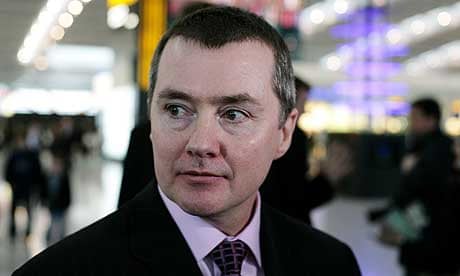British Airways posted its worst ever financial performance and scrapped its dividend today as high fuel prices and a collapse in business travel forced the airline into a loss of £401m.
BA swung from a record profit last year to its biggest deficit since privatisation in 1987 after it was hit by a near-£3bn fuel bill, the weak pound and the sudden deterioration in its most important market, transatlantic business customers, due to the banking crisis.
In a grimly pessimistic set of annual results, Heathrow airport's largest airline declined to offer investors new guidance for this year because of the dire state of the airline market.
Willie Walsh, BA's chief executive, confirmed that no upturn was in sight. "I don't think the economic environment will improve. We don't see any signs of recovery, nothing, right across the globe in all the markets we operate in," he told Guardian.co.uk.
Shares in the flag carrier fell 6.6% to 152p in early trading as Walsh added that, despite signs of the downturn bottoming out in the US, he saw "no green shoots".
No fare rises
BA's troubles at least contained good news for passengers as Walsh indicated there will be no fare rises this year, because demand was so fragile that price hikes could further damage a dwindling customer base. The airline has been forced into special offers that were unthinkable two years ago, such as two-for-one deals on the business class seats that generate the majority of its profits.
"Prices in the fourth quarter [from January to March] did come down and we fully intend to compete as aggressively as everybody else. The price that people were prepared to pay has adjusted as a result of the general economic environment," he said. Previously, BA had been determined to keep prices up at the expense of passenger volumes, but it admitted today that the strategy is untenable in the face of such a severe fall-off in demand.
The pre-tax loss of £401m for the year to 31 March, compared with profits of £922m last year, was nearly double some analysts' estimates, while the operating loss of £220m also exceeded market expectations. BA has already warned that it expects to make a loss in the forthcoming financial year.
John Strickland, an airline consultant, said the best hope for long-haul carriers such as BA was an end to the economic downturn: "The only solution is an end to the global recession."
The results statement confirmed that the deterioration in international air travel has accelerated since January, with BA recording most of its losses over the last three months – the winter months that are traditionally a quiet period for airlines. BA posted a pre-tax loss of £331m in the final quarter of its financial year as fare revenue slumped 8% and soaring operating costs exacerbated the pain – rising by 13% as the weak pound increased dollar-denominated costs, such as fuel.
The eye-watering loss was compounded by bad news elsewhere in the BA statement. The airline's cash pile, one of its key defences against the recession, was slashed by a quarter to £1.4bn as the airline consumed £483m of its reserves to keep running.
BA warned that its troubling £2bn pension deficit, which is holding up merger talks with Iberia, Spain's national carrier, may increase if stockmarkets fall further – heralding another call on limited cash resources. Net debt also soared, by £1.1bn to £2.4bn.
Costs far outstripped revenues of just under £9bn due to high fuel prices, which are at least expected to fall by £400m this year, and a slump in demand that saw the number of passengers carried by the airline fall by 4.2% to 33.1m. BA's business class cabins, which supply more than 50% of the airline's revenues, saw a 13% fall in demand over the last six months. With no sign of a revival in that profitable traffic, the carrier is frantically adjusting its cost base to cope with the alarming mismatch of operating costs and turnover.
Pay freeze
BA is preparing to impose a pay freeze and will not pay management bonuses this year. Walsh said a new pay deal for engineers will go to a ballot soon, adding that he was convinced the workforce understood the need for a pay freeze. He added: "They see what is happening around them. They understand that it is time for action."
BA said it would reduce capacity this winter by a further 4%, having reduced its schedule by 3% in the same period last year, by grounding 16 planes including eight jumbo 747s. The airline has cut 2,500 jobs since last summer, reducing its payroll to just over 40,000 people. But the airline warned in its statement that there was no end in sight to the downturn.
"The industry continues to face very difficult trading conditions, with considerable uncertainty over the likely timeframe of the global economic downturn. Current levels of traffic volume and yield [fare revenue] have not improved over the last quarter of last year. We have decided not to issue any new guidance for the half year or the full year because of the difficulty in forecasting revenues," said BA.
The BA chairman, Martin Broughton, said the poor outlook had forced the company to scrap its dividend – which was brought back in 2008 for the first time in seven years. "In light of this, the board is unable to recommend a dividend this year," he said.
The airline indicated that fares would fall over the summer after admitting that a strategy of keeping up ticket prices was not compensating for a loss of passengers. BA said it would concentrate on driving up passenger numbers – the same strategy as Ryanair, the low-cost carrier that has so far eluded the worst of the downturn.

Comments (…)
Sign in or create your Guardian account to join the discussion